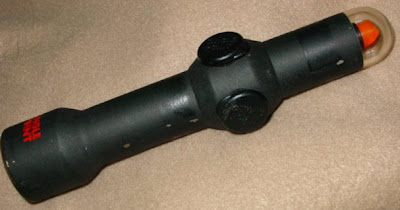Remington 700 revisited -- the CNBC coverage
I was away from this blog for a while, busy with the recent election. The political upheaval drove thoughts of guns and shooting from my mind and in any case I was busy with efforts at political persuasion. I take that to be a very good thing about America--guns aren't the first answer we think of when the gummint acts up.
As matters turned out, my side won big in the election. Now, back to talking about guns.
Not long ago there was a media brouhaha targeting the Remington 700, this time from CNBC. It is a reprise of the same old charges. If you will take a look at this old CBS story, you will see CNBC broke no new ground. USA Today quickly picked up the CNBC story. All this coverage has broad points of agreement with a set of claims made by liability lawyers.
Actually the only new thing to be learned is the Portland, Maine cop shop is retiring its 700's out of safety concerns. There is film of one (just one) of Portland's Model 700 rifles firing when it shouldn't. It is obvious to any rifleman that the rifle shown is seriously out of order. Is an out of repair rifle dangerously defective? Or is it simply dangerous because it is out of repair? What I saw is not on its face a reason to replace the rifle, so much as a reason to replace the fellow who had it apart last.
I previously did a longish writeup on the 700's peculiarities and mentioned the inadvertent firing question. Those who really know this rifle have long done things like keep the mechanism very clean, check it for correct function from time to time and refrain from trying to turn its excellent field trigger into a hair trigger.
Indeed, such practices are wisely followed with any rifle at all. Something I have not heard mentioned in media attacks on the Remington is that any rifle may malfunction dangerously if abused or messed with. Why is Remington's 700 singled out as the target here? I'm trying to figure that one out. If you know, leave me a comment.
There are about five million of these rifles in use, which means, statistically, that even unlikely problems come to light. That is part of what I like about the 700. It's been so thoroughly wrung out in hard use that we know what the problems are, what to look out for and what not to do.
Gun safety is a serious matter and everyone's responsibility. It does not do, therefore, to downplay the issues just because they have been raised before. So I don't at all intend to minimize the real issue here. If you use the 700, know the 700. If the brakes quit working on your car, you would likely notice it; have as much familiarity with the fire control parts on your rifle.
I must say, though, that it is entertaining to hear media people throwing around terms like "Walker trigger," "tricking" and so forth, investing them with a sinister significance the terms do not posses among the knowing. Any rifle can get out of order. If you know enough to spot it when it does, the failure is an annoyance. If you don't, it is, potentially, a tragedy.
An explanation of how to do the "Tricking Test" is found in this Remington internal memo from 1979. The test shows whether a rifle is subject to unintentional firing when the safety is manipulated. The memo also also explains the reasoning behind recalling the Model 600 but not the Model 700. Did Remington make the wrong call here? Should they have called back all the 700's too? It is a charge implicit within the media reporting and explicit in the liability lawyers' position that they should have. Essentially, Remington is being accused of misconduct here--that they knew of a problem and did not respond appropriately.
I suppose you can make up your own mind about that. Remington's efforts at promoting safe use of their products are well known and their retrofit programs for older rifles are detailed here.
Like the earlier CBS story, with which the CNBC story has so much in common, the CNBC story has a link to a sidebar story about why the government can't do something and demand a recall of guns, so even down to this political subtext, CNBC's show is virtually a rerun of CBS' previous story.
David Petzal, an author known, I would think, to everyone who likes guns and knows how to read, offers this counterpoint view to CNBC's story. It's well worth a read.
Remington Arms has posted its own reply here. One of the interesting points it brings out is the trouble the Marine Corps was having with its 700's was traced to jarheads monkeying with the trigger to make a light touch-off even lighter. Orders were passed along to knock that off and the problem dematerialized.
Remington Arms has posted its own reply here. One of the interesting points it brings out is the trouble the Marine Corps was having with its 700's was traced to jarheads monkeying with the trigger to make a light touch-off even lighter. Orders were passed along to knock that off and the problem dematerialized.


Comments
Post a Comment